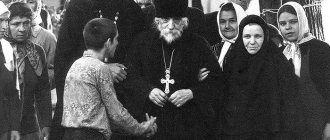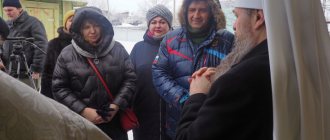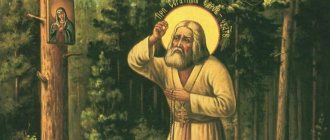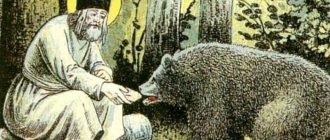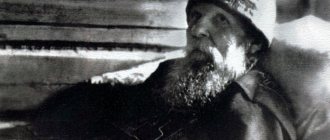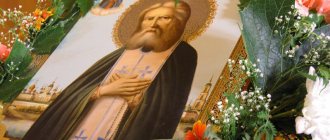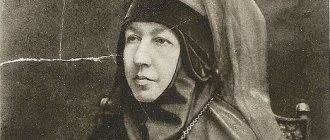People come to Orthodoxy and the Lord along different roads. Someone is born into a sincerely believing family and from early childhood perceives Christian dogmas and canons. And other people go through a long journey of quest, filled with false ideals, sinful thoughts and actions, as well as disappointments.
But, having gone through suffering, they open their hearts to the Lord with childlike spontaneity and try to carry His Word to those around them. This was the road to God for Eugene Dennis Rose, known to Orthodox people under the name of Hieromonk Seraphim.
Eugene Rose grew up as an introverted child and focused on his studies.
Eugene Dennis Rose was born on August 12, 1934 in San Diego. These were the years of the Great Depression, so the family had no time to gain spiritual knowledge or simply show affection to each other. There was simply not enough food - what was there to do with anything else.
His older sister made a significant contribution to Eugene’s upbringing.
His mother was strict, and therefore his older sister made a significant contribution to Eugene’s upbringing.
He grew up uncomplaining, very obedient and withdrawn. Eugene’s relationships with his peers were not going well, but he was doing well in mastering school material.
Eugene’s hobbies include two:
- Piano.
- Scout activities.
In 1952, Eugene graduated from school. Its management noted the young man’s success, named him its first student and awarded him a serious scholarship.
As soon as he left his home, Eugene lost interest in Christianity
While studying at school, Eugene did not bother to think about the future. He had enough of studying, piano and scouts. And now life required a decision - where to go, who to study next?
The choice fell on a private college in Pomona, as this institution was considered one of the most prestigious.
Father Seraphim (Rose)
As soon as he escaped from his mother's care, Eugene threw aside all his mother's Christian views. He wasn't interested. By his own statement, Eugene did not find the truth in Christianity. I wanted to look for it somewhere else.
In the priesthood
In the monastery they founded, Seraphim Rose continued to write religious works and, in addition, together with his spiritual brother, became involved in active missionary work. They did not stop the previously begun publication of the “Orthodox Messenger” brochures.
The next step on the path of spiritual growth was his ordination to the priesthood in 1977. From now on, Hieromonk Seraphim (Rose) received the right to personally perform the sacrament of baptism over those whom he and his brother Herman managed to convert to Orthodoxy (photo above).
For some time, Eugene was impressed by the teacher of Chinese philosophy
The search for a new foundation for spiritual life drew Eugene’s attention to Chinese philosophy—more precisely, not even to it itself, but to the Chinese professor Zhi Min-shen. This man was well versed in the heritage of his culture, lived for some time in an eastern monastery, and quoted the classics by heart.
There was not a drop of arrogance, guile, or negativity in him. This is one of the most positive people who had a great influence on Eugene Rose.
There was nothing to reproach Zhi Ming-shen for, and his love for his culture, Eastern traditions and philosophy made a strong impression on Eugene. It seemed that a new path in life had been found, but Zhi Ming-shen suddenly disappeared.
Eugene always remembered the professor with warmth, but as soon as he disappeared, he realized that Chinese philosophy attracted him only in the presence of his mentor. Eugene was unlikely to be sincerely interested in her, because he immediately abandoned her.
Beginning of active work
In the early 60s, young people began publishing religious brochures, “Orthodox Messenger,” and then opened their own shop, where they sold Orthodox books and icons. Over time, it turned into one of the spiritual centers of America. At the same time, Rose studied at theological school and served as a reader in the city cathedral.
However, Rose and his friend Gleb did not stop there. Wanting to establish a spiritual brotherhood, they purchased a plot of land in a forested area in northern California and opened a monastery there, much like those created by Russian ascetics of Orthodoxy in past centuries. Having moved into it, the friends accepted monasticism in October 1970, and Eugene took the name of a saint he greatly revered - St. Seraphim of Sarov, and Gleb - Herman of Alaska. Thus, the Orthodox world found two new monks, Seraphim and Herman. A photograph of their cell concludes the article.
Esotericist and teacher Alan Watts had a strong bad influence on Eugene
Life confronted Eugene with a new mentor. His name was Alan Watts. He grew up in a Christian environment, but did not have much interest in it. Actually, Alan Watts was not interested in any particular religious or philosophical tradition.
He was one of those people who, as they say, “gallop across Europe.” Alan Watts grabbed at everything, but did not dig deep anywhere.
One day he set out to become a Buddhist priest, realized that this did not suit him, and then became an Anglican. But he didn’t stay here either - because of adultery, his wife divorced him, and Alan Watts was forced to quit serving and preaching in 1950.
Alan Watts was a bad example for Eugene Rose, called the hippie movement Buddhism and taught these ideas to his students
Alan Watts felt that he could become a teacher, and three years later he became the head of the Academy of Oriental Studies. Contemporaries reported the following about Watts' competence as a teacher:
“No one in this world could, like Watts, explain the essence of the mystical religions of the East, while at the same time introducing even more mystery.”
Watts was an influential man, and his ideas attracted Eugene, although he later spoke about the teacher in a far from positive way:
“His philosophy is “a justification of the natural joys of life... And for this he either adopts different religions or denies them (when it is convenient for him)... This is dishonest. If you are quoting from religious sources, be so kind as to present the thought in full, relying on the entire teaching as a whole. By arbitrarily excerpting quotes that are convenient for him, he only reveals disrespect for the sources: they are just fun for him, because he himself is the deity. In this he is at one with other false shepherds.”
Alan Watts did not find refuge in any one religion, but tried to invent his own worldview system. She borrowed everything convenient from the teachings superficially known to Watts and rejected everything that was not to his taste.
This approach brought Watts into the hippie movement. Actually, he himself made enough efforts to organize this new fashion.
Alan Watts chose hippie culture over spirituality.
Watts' spiritual practices included taking drugs, free love, drinking, and living the life of a useless, listless, worthless person. He did not hesitate to identify all this with Buddhism.
It’s scary to think what such a teacher “taught” his students when he spoke about the East. In 1973, Watts died of bad habits, leaving behind a significant literary legacy on semi-spiritual themes.
Eugene imitated Alan Watts and adopted his bad habits
Eugene largely followed the example of his second teacher. Having a thirst for knowledge, he absorbed everything that Alan Watts taught. Eugene also tried to copy the teacher’s manners and began to lead an idle lifestyle:
- Ate in restaurants;
- Smoked expensive cigarettes;
- Attended the opera;
- Went to the theater;
- I drank elite wines.
Eugene Rose in his youth
Education became not so much a goal as a means to become known as an intellectual.
A friend brought Eugene to church, and he decided to become Orthodox.
Eugene Rose's search for spiritual refuge ended in Orthodoxy. One day, a fellow student took him to the Cathedral of All Who Sorrow in San Francisco. There Eugene saw the elderly, stooping Archbishop Tikhon. He impressed Eugene so much that he made him reconsider his views on Christianity.
Eugene knew almost nothing about Orthodoxy, which once again testifies to the level of competence of his teachers from the academy, where they were supposed to give an idea of all the world's religions. And the parents could not tell their son anything about this:
- Eugene’s father even thought that Orthodoxy was synonymous with Catholicism.
- Mother believed that Orthodoxy was something like communism.
Eugene tried to get to know Orthodoxy better, and it fascinated him. Without thinking twice, he abandoned his scientific career, which promised a teaching position, and became a member of the Russian Orthodox Church abroad.
Eugene Rose with a cat named Alexander. San Francisco. Early 1960s
In search of a spiritual path
Within the walls of the academy, he studied in depth Buddhism, Sufism, Judaism, Hinduism and a number of other religions. It is interesting to note that Seraphim Rose studied each of them in its own language, which speaks of his extraordinary linguistic abilities. He also spoke most European languages.
Thanks to his in-depth knowledge of Latin and French, Rose became closely acquainted with the works of the prominent philosopher and metaphysician of the first half of the 20th century, Rene Guenon, who pushed him to search for an authentic, that is, the most complete and genuine religious tradition. In his quest, he tried to maximally expand the range of religious and philosophical views he studied.
Eugene converted to Orthodoxy, was interested in Russia, and managed to reach the rank of hieromonk before his death
Since 1962, Eugene has been an Orthodox Christian. He actively participates in the life of the Church:
- Teaches Russian and Church Slavonic languages.
- Gets acquainted with the Orthodox faith.
- Publishes the educational bulletin “Orthodox Messenger”.
- He opens a shop with church utensils, icons and books.
- Studying theological courses.
- Conducts missionary talks.
- Writes articles on Orthodox topics.
- Helps organize an Orthodox monastery.
Perhaps it can be argued that Orthodoxy is the only religion with which Rose became acquainted so deeply and which evoked such a response in his soul.
In 1969, Eugene settled in a monastery, and in 1970 he took monastic vows. From that moment on, he received such an unusual name - Seraphim Rose.
1977
this year Seraphim Rose became a priest and ended his career as a hieromonk
All his life he showed great interest in Russia, preached and wrote works on Orthodox topics.
On September 2, 1982, Father Seraphim died after a serious illness.
From the book “The Experience of Comprehension of America”
In memory of Hieromonk Seraphim (Rose)
September 2, 1962 is the sad day of the death of the outstanding ascetic of piety, Hieromonk Seraphim (Rose). How amazing and varied human destinies are sometimes! One of the first books that prompted many of us, after various spiritual tossings in stagnant years, to make a conscious choice in favor of Orthodoxy, were the books of Hieromonk Seraphim Rose, read in one breath, “The Soul after Death” and “Orthodoxy and the Religions of the Future.” It was a breath of fresh air in the suffocating atmosphere of mysticism and occultism that poisoned the intelligentsia of the 80s of the sorrowful twentieth century. What was especially surprising was that the author of these books, an American, after a long spiritual quest, having gone through Zen, Confucianism, and yoga, found himself in Orthodoxy. Having read the books and learned about the thorny path chosen by this ascetic, Hieromonk Seraphim Rose, many of us fell in love with Father Seraphim for the sincerity and uncompromising nature of his strict work, however, it hardly occurred to anyone that the time would come when it would be possible to visit the legendary Platina - in the monastery founded by this ascetic. In the minds of most people of the Soviet era, the image of America as a hopelessly distant and hostile country, imbued with the spirit of Satanism, was firmly formed. However, by the grace of God, the iron curtain fell, and, despite certain difficulties, this became possible.
In memory of Hieromonk Seraphim (Rose). Monastery of St. Herman of Alaska, founded by Hieromonk Seraphim
In general, Orthodox America is amazing. How many monasteries and temples are there on the East Coast! The centers of Orthodoxy are the Jordanville Holy Trinity, St. Tikhon's monasteries with their powerful publishing resources and theological seminaries, in which many hierarchs of the Church Abroad studied, cozy Novo-Diveevo, New Root Hermitage, monasteries and churches in New York, Philadelphia, Washington, Cleveland... The soul is filled with quiet joy when you see how Orthodox traditions are carefully preserved in the distant overseas land. But the Pacific coast is even more impressive: the relics of St. John of Shanghai in San Francisco, monasteries in Manton, Calistoga, Santa Rosa, Sao Paulo, and, finally, Platina... It’s not far from San Francisco, about 4– 5 o'clock. This seemed like an easy walk to us, accustomed to long, hours-long journeys.
In memory of Hieromonk Seraphim (Rose). Monastery of St. Herman of Alaska, founded by Hieromonk Seraphim, lost in the mountains of California
And the nature in these places is unique - high steep mountains covered with forests, vast horizons and a narrow serpentine road - indescribable beauty. The lines of Psalm 103 come to life and are filled with new meaning: My righteous God, infinitely holy, You are clothed with unspeakable greatness. You dress yourself in light, like a robe, Above the capricious ocean ridge. You stretch out the Dome of Heaven like a tent, you open the Bright Palace like a cover. A ghostly cloud on a chariot You rush swiftly on the wings of the winds. The car bounces slightly on sharp turns, but it’s not scary at all: in such an extraordinarily beautiful place, nothing bad can simply happen, and after the steep serpentines of British Columbia, it’s unlikely that anything can scare us. And when, after another dizzying climb to the left of the road, the monastery opens up to the eye, the soul seems to rush to Heaven. A random traveler will freeze in amazement. Having seen the unknown wonderful world, the monastery reveals the cherished secrets of St. Herman. The ringing of bells is woven into Eternity, The dawn quietly calls out to the dawn... Secrets are hidden from the eyes of the unworthy by the strict walls of the monastery.
The holy gates, on which the name of the monastery is written, seem to be the gates to the Heavenly monastery. The marvelous white church with golden domes is touching, which at first seems small, almost like a toy. The gilding shines through the greenery of the tall pines, and this makes it especially joyful. The air is fresh and clean. You can feel the calming autumn coolness. To be honest, we were a little tense when we got up here. It’s been a steep roller coaster ride, as they say... But now it’s especially nice to realize that only Heaven is above us.
The temple is like a birch tree - light, white, reaching towards the sky. The architecture is reminiscent of Valaam from the time of Abbot Nazarius. The walls are white, the icons are not luxuriously decorated, they are just as modest and ascetic as everything else on the territory of the monastery. Somewhere in a niche of the bell tower window, a cat comfortably settled down, having previously paraded in front of us. Cats are the same everywhere. We are hospitably greeted by Brother Donald, who accompanies us to the cell where we will spend the night and arranges the time for the excursion. It’s only a stretch to call a place to spend the night “cells”: these are tiny, windswept, ramshackle houses clinging to the mountainside. There is, however, a stranger. It is located outside the monastery, and everything in it is just as simple, harsh, and ascetic. Wooden beds, homespun bedspreads, outdoor amenities.
In America, it is not easy to encounter such austerity of monastic life: here even in monasteries they are accustomed to certain amenities. For example, the monastery of St. St., located not far from here. John of Shanghai in Monton, which belongs to the jurisdiction of the Orthodox Church of America, where we also visited, is much more comfortable. But we, pilgrims with many years of experience, accustomed, if necessary, to sleeping on the floor in churches, like such austerity: after all, everything remains as it was in the time of Father Seraphim. The starry midnight prophesies salvation, The crowns of the trees tremble with leaves, The silence of the night breathes mystery, Feeding the soul with living prayer. Hear us, Reverend Herman, May the merciful God listen to you. Be our reliable and faithful assistant At all crossroads of difficult roads.
It is not at all confusing that the service in the temple is in the so-called sacred English language. Everything is so clear that not the slightest difficulty arises, since the course of the service does not differ at all from what we are accustomed to. The same litanies, the sequence of Vespers, Matins, Midnight Office, Divine Liturgy, Cherubic Liturgy, Eucharistic Canon, Communion - there is practically no language barrier. Yes and some exclamations are pronounced in Church Slavonic, perhaps out of respect for the pilgrims. By the way, some brothers understand Russian and even speak it.
Despite the strictness of monastic life, the inhabitants of the monastery are hospitable, sociable, and moderately inquisitive. Well, you can only guess how sociable we are! We are ready to open our arms to everyone, even dogs. By the way, the dogs here are also wonderful.
However, let us turn to the biography of the founder of the monastery. The future hieromonk Seraphim (Rose) was born on August 12, 1934 in California, in the resort town of San Diego into a Protestant family. After graduating with honors from high school, he went to college in Pomona, near Los Angeles, in 1952. In 1956, after graduating from college, he entered the Academy of Oriental Studies in San Francisco, where he studied comparative analysis of religions, which gave him the opportunity to try himself in various spiritual schools: Hinduism, Buddhism, Judaism, Sufism, etc. He studied each religion for its native language.
For example, he read Confucian texts in ancient Chinese. At the university, he received a master's degree for his work on ancient Chinese dialects. He knew French and Latin perfectly. Here he first became acquainted with the works of Rene Guenon, and, following him, embarked on the path of searching for an authentic spiritual tradition. Because of his friendship with Jon Gregson, a fellow student at the Academy of Oriental Studies, and after visiting the Russian Orthodox Cathedral of All Who Sorrow in San Francisco, he broke with Buddhism and began attending Orthodox services, learning the Russian language, and studying books about Orthodoxy.
In 1961, having completed his bachelor's thesis, and despite the fact that he was predicted to have a brilliant career at the university, he left his studies for the time needed to write a book - a study of the spiritual state of modern man. On February 15, 1962, in San Francisco, he was received into the Russian Orthodox Church Outside of Russia through the sacrament of confirmation and was a spiritual child of St. John of Shanghai. After baptism, he met a Russian emigrant, a graduate of the Holy Trinity Theological Seminary in Georgeanville, Gleb Podmoshensky. Together they began publishing the Orthodox Bulletin bulletin, then opened the Orthodox Icons and Books shop at the church - one of the first in the USA, which became one of the spiritual centers of Russian Orthodoxy in America.
Eugene intensively studied Russian and Church Slavonic, was a reader in church, and graduated from theological school in San Francisco. In the mid-1960s, Eugene and Gleb decided to found an Orthodox brotherhood. In 1967, in northern California, in a forest near the town of Platina, a plot of land was purchased on which a monastery was erected in honor of St. Herman of Alaska. In 1969, they moved to the monastery, and on October 27, 1970, they became monks: Eugene under the name Seraphim in honor of Seraphim of Sarov, and Gleb under the name Herman in honor of Herman of Alaska. In the monastery they continue to publish the “Orthodox Messenger”, write and publish works of spiritual, educational and theological content, and conduct active missionary activities. In 1977, Father Seraphim was ordained a priest. The grave of Hieroschemamonk Seraphim (Rose) Died on September 2, 1982 at the age of 48 from illness.
Death o. Seraphim brought with her something extremely surprising for our time. His body, lying in a plank coffin in the middle of the monastery church in the heat of the late California summer, remained completely alive to sight and touch, and the appearance of his face was so bright and comforting that we, contrary to the ancient monastic custom, did not dare to close it. Even the children stood around the coffin, unable to move away. Before us lay a man of holy life who disrupted the natural process of decay, and our hearts responded to God's grace.
Archbishop Chrysostomos. “Memories of Fr. Seraphim (Orthodox America, Aug.-Sep. 1982)» QUOTES
It would be too superficial a conclusion to say that the glorification of the New Martyrs and the Royal Family will lead to the restoration of Holy Rus'. But Orthodox Russian people both in Russia and in the diaspora, if they accept this event with all their hearts, then it can serve as a reason for repentance of sins, and its influence on Russia itself cannot be measured... Hieromonk Seraphim (Rose). "The Future of Russia and the End of the World"
“There is no greater affinity and closeness than that of God with the soul and the soul with God,” wrote Saint Macarius the Great. “When the soul is deprived of God, it begins to search.” She does not find it in Catholicism, because Catholicism is a provincial version of genuine Christianity, clogged with human speculation. She will not meet God in Protestantism either, because for Protestants God is something extremely personal, hidden in the depths of the soul, and in such depths that it is not clear whether there is a God for Protestants. And there will be no meeting in the so-called Eastern religions, because in some of them there is simply no God, in others idols take the place of God, and in others there seems to be a God, but nothing is known about him.
But here is Orthodoxy. A religion that captivates many, at first only with the majestic, unearthly beauty of the liturgical rite. “We don’t know where we were - on earth or in heaven, where the angels sing,” Russian ambassadors who attended services in Constantinople told Saint Prince Vladimir. A soul that has almost despaired of finding God suddenly meets Him: unexpectedly, unpredictably and truly. She begins a completely different life, previously as if unknown to her, always desired and joyfully recognized. This is Orthodoxy - true Christianity, free from human thoughts.
Tatiana Lazarenko. From the book “The Experience of Comprehension of America”
Author:
Tatiana
We publish in the telegram earlier than on the website. Subscribe to the Pravlife Channel
Tags
- In memory of Hieromonk Seraphim (Rose)
- Tatiana Lazarenko
The book “Soul” after death by Seraphim Rose describes the experience of dying based on the works of the Holy Fathers
Seraphim Rose is the author of numerous works on Orthodox topics. But his most famous book is “The Soul after Death.” The purpose of writing it is to show the reader the Orthodox view of the afterlife.
It is no secret that Holy Scripture hardly touches on this topic. Seraphim Rose decided to use all the sources that he considered worthy of trust and form a picture of the afterlife of an Orthodox Christian.
“The Soul after Death” Buy the book on the ChitayGorod website
Cover of the book “The Soul after Death” by Seraphim Rose
He considered it an “answer” to numerous descriptions of post-mortem experiences that people talked about after clinical death.
The author himself succinctly speaks about the structure of the book:
“In the nine chapters of this book we have attempted to set out some of the basic aspects of the Orthodox Christian view of life after death, contrasting them with the widely held modern view, as well as with views emerging in the West which in some respects have departed from ancient Christian teaching.”
And the tenth, final chapter describes step by step the experience of dying from the point of view of Seraphim Rose, for example:
“The other world, although it will not be completely alien to us, will not turn out to be just a pleasant meeting with loved ones “at the resort” of happiness, but will be a spiritual clash that tests the disposition of our soul during life - whether it leaned more toward the Angels and saints through a virtuous life and obedience to the commandments of God, or, through negligence and unbelief, she made herself more suitable for the society of fallen spirits.”
In this case, Seraphim Rose refers mainly to the letters of Theophan the Recluse and the works of a number of other figures of the Church.
The book ends with discussions on prayer, bodily resurrection, and an appendix with prayers and responses to critics.
Monk Seraphim Rose
Major works
- [lib.pravmir.ru/library/book/906 “Orthodoxy and the religion of the future”] (1975);
- [pravbeseda.ru/library/index.php?page=book&id=100 “The Taste of True Orthodoxy”] (1978);
- [lib.pravmir.ru/library/book/909 “Orthodox view of evolution”] (1978);
- [lib.pravmir.ru/library/book/394 “Signs of the Times”] (1980);
- [lib.pravmir.ru/library/book/393 “How to be Orthodox today”] (1980);
- [www.pravoslavie.ru/put/shagi/rose_sad.htm “The Soul after Death”] (1980);
- [lib.pravmir.ru/library/book/392 “Secrets of the Book of the Apocalypse”] (1980);
- [portal-credo.ru/site/print.php?act=lib&id=80 “The Future of Russia and the End of the World”] (1981);
- [shestodnev.narod.ru/rouz_genesis/index.html “Orthodox understanding of the book of Genesis”] (1981);
- [www.pravbeseda.ru/library/index.php?page=book&id=453 “When God reveals himself to the heart”] (1981);
- [www.pravbeseda.ru/library/index.php?page=book&id=455 “Holy Fathers: the right path of Christianity”] (1983);
- [www.pravmir.ru/sovet-sovremennikam/ “Advice to contemporaries”] (1984);
- [lib.pravmir.ru/library/book/904 “If I forget you, Jerusalem”];
- [pravbeseda.ru/library/index.php?page=book&id=941 “Orthodox monasticism in Gaul in the 5th-6th centuries”];
- [lib.pravmir.ru/library/book/1139 “Holy Fathers of Orthodoxy”];
- [books.google.ru/books?id=vOOhkgAACAAJ&hl=ru “God’s revelation to the human heart”] (audiobook). — Danilovsky evangelist, (2008). ([ablbooks.eu5.org/index.php?newsid=2713 MP3]);
- [books.google.ru/books?id=5otykgAACAAJ&hl=ru “The path to salvation in the modern world”] (electronic resource, translation). — Danilovsky evangelist, (2008). — ISBN 5891012596, ISBN 9785891012592;
- [books.google.ru/books?id=g899kgAACAAJ&hl=ru “Modern subhumanity: on the meaning of our existence”] (electronic resource, translation). — Danilovsky evangelist, (2008). — ISBN 5891012715, ISBN 9785891012714;
- [books.google.ru/books?id=Jeh9kgAACAAJ&hl=ru “Man against God”] (electronic resource, translation). — Danilovsky evangelist, (2009). — ISBN 5891013460, ISBN 9785891013469;
- [books.google.ru/books?id=a2qLkgAACAAJ&hl=ru “American educator of the Russian people: from the unpublished”] (collection of works). - Nikea, (2010). — ISBN 5917610207, ISBN 9785917610207;
- [www.ozon.ru/context/detail/id/7632845/ “The Offering of an Orthodox American”] (collection of works). — Russian pilgrim, (2011). — ISBN 978-5-98644-021-7;
- Hieromonk Damascene (Christensen).
[sretenie.com/book/element.php?ID=35419 Father Seraphim (Rose). Life and works.] - Sretensky Monastery, (2009). — ISBN 978-5-7533-0345-5.
Alas, Seraphim Rose was a biased and weak orientalist
It would be wrong and unfair to say only good things about the works of Seraphim Rose. His works should be treated with caution.
Due to the mediocre teachers at the Academy of Oriental Studies, Seraphim Rose was a very weak and biased religious scholar. He did not hesitate, not having clear ideas about other people's religions, to attack them with harsh and unfounded criticism. He was guided by speculation and rumors.
Seraphim Rose was poorly versed in Eastern traditions, but criticized them
Seraphim Rose especially forgot about religious tolerance when he talked about Hinduism and easily put “equal” between it and “black magic” (another area in which he was not oriented). For example, Seraphim Rose made the following mistakes:
- In the phrase “Pranayama is breathing exercises combined with japa,” he demonstrates incompetence, because these are different techniques, and their combination has a different name - “Ajapa Japa.”
- He roughly identified the Goddess Kali, who terrified evil demons and symbolized destructive time (if in Christian terms, the transition from the sinful world to the Heavenly Kingdom), with death and horror and criticized the iconography of the Hindu Goddess for the presence of bloody subjects.
It would be interesting to know what epithets Seraphim Rose might use to describe the veneration of relics or scenes like “The Beheading of John the Baptist” if he had grown up outside of Christian culture.
Therefore, Seraphim Rose's writings on other religions should not be overestimated. Unfortunately, they are not much more competent than the works of his teacher Alan Watts.
By leaving a comment, you accept the user agreement
Notes
- [hristov.narod.ru/letopis5.html]
- [www.shestodnev.ru/Seraphim/StSeraphim.htm Venerable Seraphim of Platinum (Rose).]
- [karelin-r.ru/newstrs/118/1.html Website of Archimandrite Raphael (Karelin).]
- [www.saint-fathers.org/serafim-rouz.html Hieromonk Seraphim Rose at saint-fathers.org.]
- [shestodnev.ortox.ru/prepodobnyjj_serafim_platinskijj_%28rouz%29/view/id/1109795 Venerable Seraphim of Platinsky (Rose). Preparation of materials for canonization.]
- [www.aolshanski.ru/index.php?option=com_content&view=article&id=340:2012-03-23-15-10-25 Violetta Yufereva.
“Procession from the Kursk province” (quoted by Seraphim Rose).] - [rousserafim.narod.ru/splatin.html International Christian Mission of St. Seraphim of Platinum.]
- [old.eparhia-saratov.ru/txts/journal/articles/05ascent/2_1.html]

